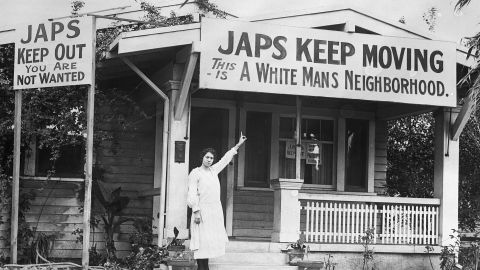
A variation of this tale appeared in CNN’s What Matters publication. To get it in your inbox, signal up for totally free below.
CNN
—
New endeavours to bar Chinese citizens and others from possessing property in Texas and other states echo the treatment of Asian individuals in the US much more than 100 many years ago, when Congress barred them from acquiring citizenship and multiple state rules restricted land possession.
- In Virginia, Gov. Glenn Youngkin is anticipated to signal legislation to bar citizens of nations the Point out Office has specified as “foreign adversaries” from proudly owning agricultural land. Corporations with deep ties to those people international locations would also be influenced. People international locations presently include China, Russia, North Korea and Iran. There are very similar proposals in Montana, Wyoming and North Dakota. Foreign homeowners handle a fraction of US farmland, in accordance to the Congressional Analysis Services.
- In Texas, a a lot broader proposal names people international locations and bans citizens of them from possessing any land in any respect. The ban would presumably prolong to legal immigrants residing in the US. That monthly bill is even now working its way as a result of the legislature but has the guidance of Gov. Greg Abbott.
The Texas proposal in particular exclusively remembers a despicable chapter in US history, when so-identified as Alien Land Legislation ended up passed in quite a few states concerning the 1880s and 1920s to specially bar Asian men and women from proudly owning land. The California Alien Land Regulation was sooner or later overturned by the Supreme Court in 1952 for violating the 14th Amendment.

Chinese individuals were being explicitly barred from immigration to the US for generations – from the 1880s, when Congress handed the Chinese Exclusion Act, right until that law’s repeal for the duration of Entire world War II.
So few Chinese people today ended up allowed to immigrate for another era following that till 1965 – 105 per calendar year – that it amounted to a de facto ban.
As a consequence, the anti-Asian residence legal guidelines typically afflicted Japanese People.
While the guidelines did not exclusively single out Asians, they were being applied to men and women “ineligible for citizenship.”
That manufactured the laws specially use to Asians considering the fact that Congress, at the time, allowed citizenship only for immigrants coming from Europe or Africa.
The most infamous instance of Alien Land Guidelines was in California, which handed a number of versions of these legal guidelines more than the decades, and the place Asian immigrants had been concentrated.
One celebrated and yearslong court docket battle pitted a Japanese immigrant, Jukichi Harada, who discovered a way all around the legislation by having his young children very own the property where by his spouse and children lived in Riverside, California. They have been finally able to maintain the dwelling when a judge ruled in their favor in 1918, but they had been afterwards moved to internment camps through Globe War II due to the fact of their Japanese ancestry.
Now, the Harada Home is a National Historic Landmark and a museum.
I named Madeline Hsu, a history professor and skilled in Asian American studies at the College of Texas at Austin, to question if these new proposals are an instance of history repeating by itself.
“It’s surely sort of reinvocation of sort of what folks in Asian American reports would refer to as ‘Yellow Peril’ fearmongering,” she reported.
“There are methods in which it resonates with what took place to Japanese Us residents through Entire world War II, exactly where no matter of citizenship, no matter of nativity, they have been racially classified as enemy aliens.”
Hsu pointed me to an write-up in the Journal of Southern Heritage by the University of Texas Rio Grande Valley professor Brent Campney that documents fears of a Japanese “invasion” in the Rio Grande Valley extra than 100 many years in the past.
Campney’s larger argument in studying the procedure of Asian Us residents, in this scenario men and women of Japanese descent, is that the area discrimination in Texas and also California reverberated back into the developing animosity between Japan and the US foremost up to Planet War II.
A long time just before the US government robbed Japanese Individuals of their legal rights and held them in camps, Campney writes, “white People appealed to the identical stereotypes and exclusionary impulses utilised from the Japanese all through the internment, exacerbating tensions amongst Japan and the United States.”
That is a historic lesson all people has an interest in finding out as tensions among the US and China expand currently. The US armed forces is maneuvering with allies to control China in the Pacific. The US federal government is targeted on building the economy far more independent from Chinese production. There is even discuss of banning TikTok, the app well-liked with youthful individuals in the US and owned by a private Chinese business.
These efforts versus a govt seep into more problematic territory when they appear to goal the several Chinese and ethnic Chinese people who stay in the US.
“Targeting folks by nationality is also problematic,” Hsu mentioned. “That’s not a very good way of pinpointing individuals who are countrywide safety threats or who are acting on behalf of a international govt.”
She drew a correlation among these new point out proposals and former President Donald Trump’s assure to implement a ban on Muslims traveling to the US. In order to get a system by way of the Supreme Court docket, he in its place banned, for a time, journey from selected nations in Africa, Asia, the Middle East and South America.
The Texas monthly bill likewise targets certain international locations by name and generalizes that all citizens of individuals nations around the world could be a risk.
“The only thing it does is it expresses these sorts of intestine suspicions and hostility to these nations,” Hsu stated.





